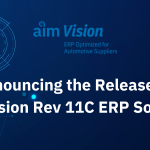Unleashing the True Potential of Your ERP
Unleashing the True Potential: The Importance of Fully Implementing Your ERP Software System after Purchase
Investing in an Enterprise Resource Planning (ERP) software system is a significant decision that holds the promise of transforming business operations and driving growth. However, merely purchasing the ERP software is not enough to reap its full benefits. The real value lies in fully implementing the ERP system across all facets of the organization. In this blog article, we will explore the importance of completing the ERP software implementation process and how it can lead to enhanced efficiency, streamlined processes, and a competitive advantage in today’s dynamic business landscape.
1. Maximizing ROI on ERP Investment
The financial investment in an ERP system can be substantial, but the returns can be even more significant when the system is fully implemented. Completing the implementation ensures that the ERP’s capabilities are harnessed to their fullest potential, leading to improved productivity, reduced operational costs, and increased profitability. It’s crucial for businesses to view ERP implementation as a long-term strategic investment that can yield substantial returns over time.
2. Streamlining Business Processes
A fully implemented ERP system integrates all core business processes, creating a unified platform for data sharing and collaboration. This streamlining of operations eliminates silos, redundant tasks, and manual errors. Employees can work more efficiently and make well-informed decisions based on real-time data. From finance and inventory management to HR and customer service, a fully implemented ERP software system enhances the overall efficiency of the organization.
3. Improved Decision-making and Business Insights
An ERP system captures vast amounts of data from various business processes. However, without full implementation, organizations may not be able to leverage this data effectively. By completing the implementation process, businesses gain access to comprehensive analytics and reporting tools. This empowers decision-makers to identify trends, forecast future demands, and make data-driven strategic decisions. The ability to analyze and act on real-time insights is a game-changer in the competitive business landscape.
4. Enhanced Cross-departmental Collaboration
An ERP system acts as a centralized repository of data, fostering better communication and collaboration among different departments. With information accessible to relevant stakeholders, employees can work together seamlessly, leading to improved coordination and synergy across the organization. This collaborative environment promotes a culture of innovation and agility, driving the organization towards its goals more effectively.
5. Adherence to Industry Best Practices
ERP software systems are designed to incorporate industry best practices across various sectors. By fully implementing the ERP system, businesses can align their processes with these established standards. This not only ensures compliance with regulations but also allows organizations to adopt proven methodologies for better performance and customer satisfaction.
6. Regulatory Compliance and Risk Mitigation
Staying compliant with industry regulations and government requirements is critical for any business. ERP software systems can assist in ensuring compliance by automating data collection, reporting, and auditing processes. Systems like AIM Vision, which specialize in the automotive industry, helps suppliers meet and manage all their EDI, bar code, and operations (ex. MMOG) requirements. Moreover, by maintaining accurate records and documentation, ERP systems help reduce the risk of penalties and legal issues, safeguarding the organization’s reputation and financial stability.
7. Supporting Scalability and Growth
As businesses evolve and expand, their ERP needs may change. A fully implemented ERP system can easily adapt to new requirements and support the organization’s growth journey. Whether it’s adding new functionalities, integrating with third-party applications, or expanding into new markets, a well-implemented ERP system provides the flexibility to scale without disruptions.
The importance of fully implementing your ERP software system cannot be overstated. It is the key to unlocking the true potential of your investment and driving long-term business success. By streamlining processes, improving decision-making, and promoting collaboration, a fully implemented ERP system empowers organizations to thrive in today’s competitive landscape. Organizations should approach ERP implementation as a strategic initiative and dedicate the necessary resources, time, and expertise to ensure a seamless and successful transition. Embracing the full potential of ERP will undoubtedly lead to greater efficiency, innovation, and a sustainable competitive advantage.



